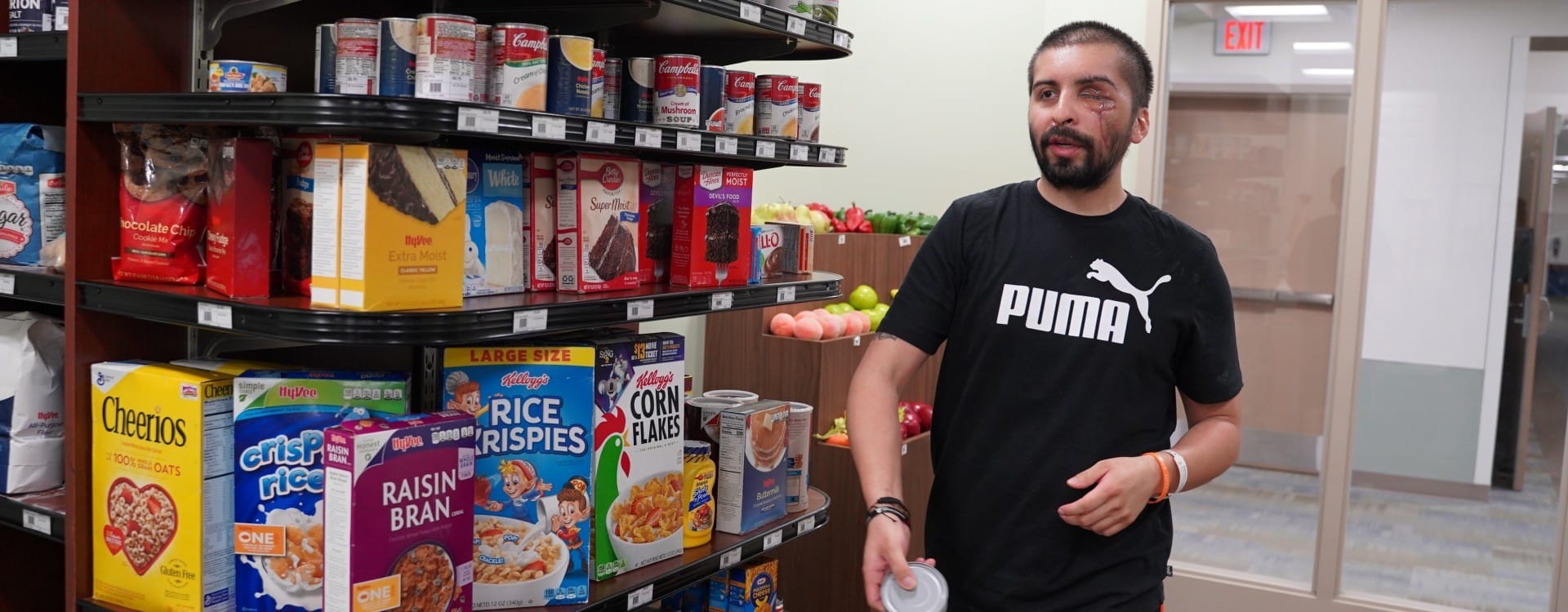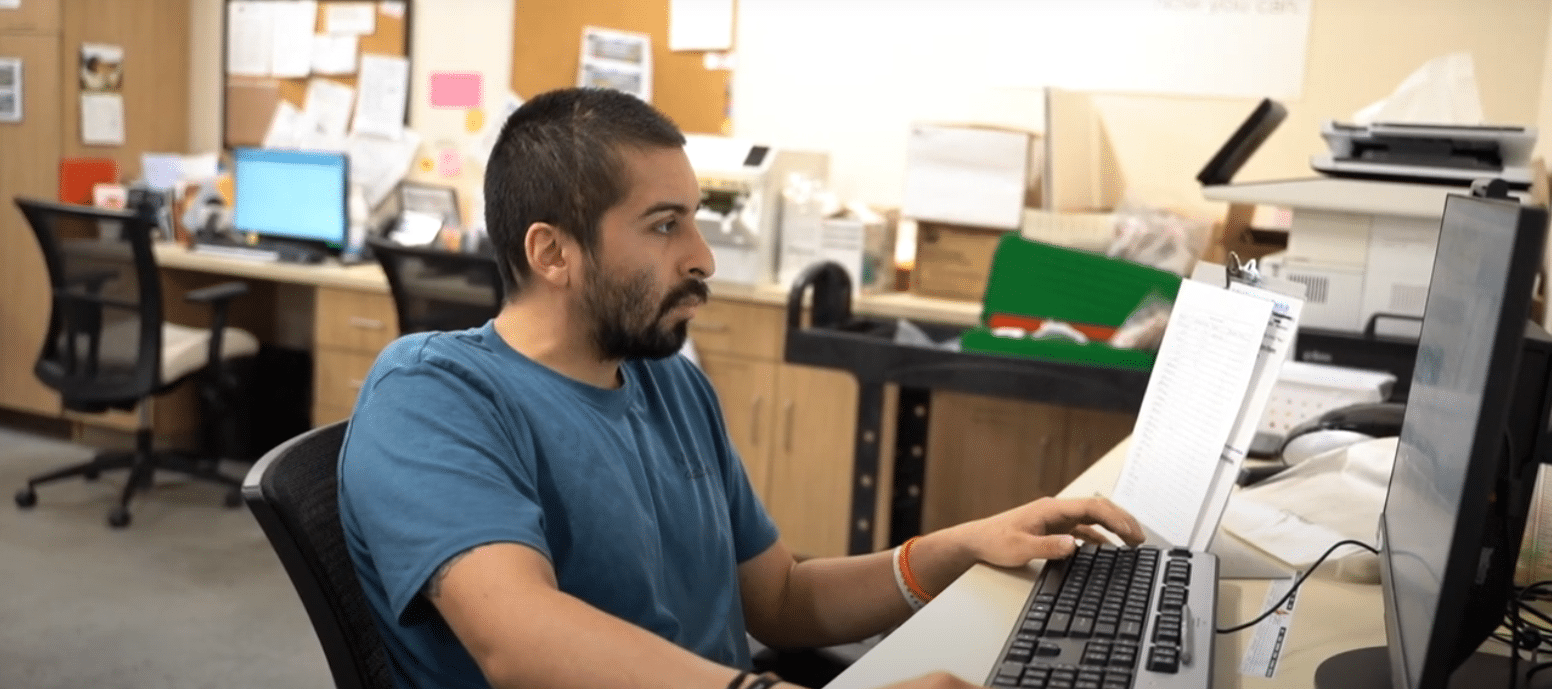During his six years in the Marine Corps, 27-year-old Francisco Barajas says he always wanted to be the best at everything.
“I was always trying to be the best physique, be in the best shape I could be and be mentally better,” he said. “Every day, I pushed myself to be better than I was the day before.”
That drive to succeed has aided in his recovery after a workplace accident left him with traumatic injuries to his face, torso and leg.
“Now that I’m not [on] active duty, I work in a company where I fit and weld,” Francisco said. “I was grinding and a grinder broke in three, and it hit me in the face, side and leg. I was wearing my helmet, my eye gear and a face shield for grinding. The face shield got cut, the eye gear got cut and a little incision on my helmet got cut.”
The impact of the grinder also knocked Francisco back, hitting his head on the floor and sustaining a traumatic brain injury. He came to Madonna Rehabilitation Hospitals’ specialized program for injured workers to recover.
“When he first got here, he had already been doing really well physically, and was doing most, if not all, of his self-cares with supervision and progressed to independence quickly,” Abby McClure, MOT, OTR/L, CBIS, a Madonna occupational therapist, said.
Francisco struggled the most with his higher-level cognitive skills and his written and expressive language.
“It was frustrating because I would start thinking, ‘Why is this going on?’ Francisco said. “I know how to read, but I couldn’t. I could see words but my mouth wouldn’t be able to say them. I couldn’t understand them.”
Claire Valentine, MS, CCC-SLP, a Madonna speech-language pathologist, remembers the first time she met Francisco. He was unable to speak and confused.
“He was young so I thought he’d be talkative and outgoing,” Valentine said. “He was terrified, I could tell. He looked at me and he kept looking at [his] family for answers. He’d give one and two-word responses. Sometimes the responses would be accurate and sometimes they wouldn’t. You could just tell he was really in over his head and didn’t quite know what was going on.”
Both McClure and Valentine said Francisco rapidly progressed, meeting each therapy goal ahead of schedule.
“The first task I gave him, I had to read every clue for him, for him to be able to complete the task,” McClure said. “By the end of his three weeks of inpatient therapy, he was doing our most challenging tasks on his own.”
As he made progress, Francisco pushed himself toward his ultimate goal at Madonna. He was adamant to return to work in some capacity, as soon as possible. McClure quickly enrolled him in Madonna’s Work Re-Entry program, to help practice the skills he would need as he rejoined the workforce.
“We knew he wasn’t going back to the heavy machinery tasks that he had been doing, at least not right away, and he told us he would be doing more computer work and more secretarial tasks, so we got him in with our purchasing department,” McClure said. “Purchasing was able to work with him on data entry on the computers to help with some of their durable medical equipment. We also had him filling different purchasing orders, which involves reading a list, navigating their space and their rows of items that are needed, and being able to coordinate and make sure everything’s accurate.”
Valentine also incorporated Madonna’s Independence Square to simulate other community reintegration tasks for Francisco.
“You can use all those cognitive skills at [the] bedside and do all kinds of pencil-paper tasks, but it’s not until you get into those more functional tasks that you see what real life is like,” Valentine said. “It’s great that we have Independence Square to simulate those functional tasks. What’s more functional than going to the grocery store?”
Francisco not only challenged his cognition but also his language skills as he made his way through the aisles of Madonna’s simulated grocery store.
“He had to work on problem-solving and pathfinding by saying, ‘Ok, I’m looking for this particular item. What section would it be in?’” Valentine said. “But, I also added an extra step and made him identify specifically what I’m looking for. At the beginning, it took us a while, but by the end of his stay, he was anticipating what I would ask him before I even said it. He could tell me the price. He could tell me the calorie count. He could tell me the ingredients. And he understood what I was asking.”
In brain injury recovery, being as young and active as Francisco benefited him. His care team says being a former Marine was also key to his success.
“I always tell all my patients, they can have the best therapy, the best therapists and the most rigorous tasks, but if they don’t have the commitment and the buy-in to the therapy, then they’re not going to get the most out of it,” Valentine said. “He knew things were going to be difficult. He knew he might fail at certain tasks, but that would only make him better. When it was time for therapy, he was focused and he was determined.”
As his brain healed and he achieved therapy goals, Francisco’s confidence grew. Knowing he’d be able to safely get back to his work and his hobbies, he says, meant the world to him. It inspired him to push himself and keep a positive attitude.
“I still always try to be the best, and I think that’s what’s helping me get better as fast as I can,” he said. “I’m so thankful that even though I’m injured, I can laugh, I can joke, and most importantly, I’m still here. I’m alive. So, I try to do my best.”






